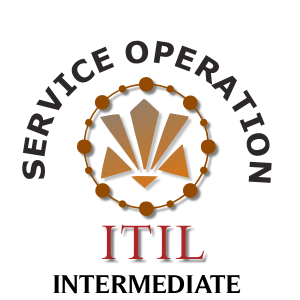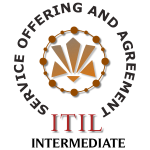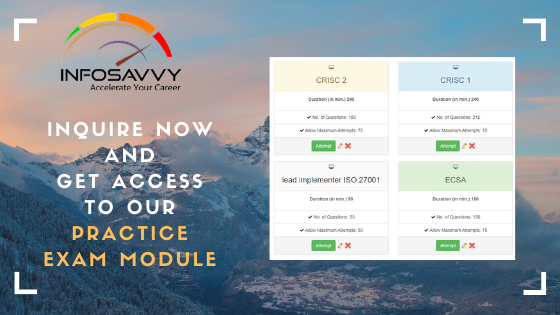The ITIL Intermediate Qualification: Service Operation Certificate is a free-standing qualification but is also part of the ITIL intermediate lifecycle stream, and one of the modules that leads to the ITIL Expert Certificate in IT Service Management. The purpose of this training module and the associated exam and certificate is, respectively, to impart, test, and validate the knowledge on industry practices in service management as documented in the ITIL Service Operation publication.
- Introduction to service operation
- Full understanding of service design terms and core concepts.
- The purpose, objectives and scope of service operation
- The value to the business
- The context of service operation in the ITIL service lifecycle
- The fundamental aspects of service operation and the ability to define them.
- Full understanding of service design terms and core concepts.
- Service Operation principles
- The knowledge, interpretation and analysis of service operation
principles, techniques and relationships and their application to the delivery and support of services at agreed levels.- How an understanding of the basic conflict between maintaining the status quo and adapting to changes in business needs can lead to better service operation
- Other service operation principles including: involvement in other lifecycle stages; understanding operational health; the need for good documentation and communication including a communication strategy
- Service operation inputs and outputs.
- The knowledge, interpretation and analysis of service operation
- Service operation processes
- The knowledge, interpretation and analysis of service operation
principles, techniques and relationships and their application to the delivery and support of services at agreed levels.- The use, interaction and value of each of the service operation processes: event management, incident management, request fulfilment, problem management, and access management.
- The knowledge, interpretation and analysis of service operation
- Common service operation activities
- The knowledge, interpretation and analysis of service operation
principles, techniques and relationships and their application to the delivery and support of services at agreed levels.- How the common activities of service operation are co-ordinated for the ongoing management of the technology that is used to deliver and support the services
- How monitoring, reporting and control of the services contributes to the ongoing management of the services and the technology that is used to deliver and support the services
- How the operational activities of processes covered in other lifecycle stages contribute to service operation
- How IT operations staff should look for opportunities to improve the operational activities.
- The knowledge, interpretation and analysis of service operation
- Organizing for service operation
- The knowledge, interpretation and analysis of service operation
principles, techniques and relationships and their application to the delivery and support of services at agreed levels.- The role, objectives and activities of each of the four functions of service operation: service desk, technical management, IT operations management, and application management
- Service operation roles and responsibilities, where and how they are used as well as how a service operation organization would be structured to use these roles.
- The knowledge, interpretation and analysis of service operation
- Technology considerations
- The knowledge, interpretation and analysis of service operation
principles, techniques and relationships and their application to the delivery and support of services at agreed levels.- The generic requirements of technologies that support service management across all lifecycle stages
- The specific technology required to support the service operation processes and functions.
- The knowledge, interpretation and analysis of service operation
- Implementation and improvement of service operation
- The knowledge, interpretation and analysis of service operation
principles, techniques and relationships and their application to the delivery and support of services at agreed levels.- Specific issues relevant to implementing service operation including: managing change in service operation; assessing and managing risk in service operation; operations staff involvement in service design and service transition
- Planning and implementing service management technologies within a company.
- The knowledge, interpretation and analysis of service operation
- Challenges, critical success factors and risks
- The knowledge, interpretation and analysis of service operation
principles, techniques and relationships and their application to the delivery and support of services at agreed levels.- Be able to provide insight and guidance for operational challenges, risks and critical success factors
- The knowledge, interpretation and analysis of service operation
• Chief information officers (CIOs)
• Chief technology officers (CTOs)
• Managers
• Supervisory staff
• Team leaders
• Service designers
• IT architects
• IT planners
• IT consultants
• IT audit managers
• IT security managers
Prerequisite Entry Criteria
Candidates wishing to be trained and examined for this qualification must already hold the ITIL Foundation Certificate in IT Service Management which must be presented as documentary evidence to gain admission Candidates who hold the following ITIL qualifications are also eligible, and similar evidence will be required:
• Earlier ITIL (V2) Foundation plus Foundation Bridge
• ITIL Expert Certificate in IT Service Management (achieved via Service Manager or Practitioner bridging routes).
Eligibility for Examination
To be eligible for the ITIL Intermediate Qualification: Service operation examination, candidates must have fulfilled the following requirements:
• At least 18 contact hours (hours of instruction, excluding breaks, with an Accredited Training Organization (ATO) or an accredited e-learning solution) for this syllabus, as part of a formal, approved training course/scheme
• A basic IT literacy and around 2 years IT experience are highly desirable
• Hold the ITIL Foundation Certificate in IT Service Management
• It is also recommended that candidates should complete at least 21 hours of personal study by reviewing the syllabus and the ITIL Service Transition publication in preparation for the examination
Format of the Examination
- Type: Eight (8) multiple choice, scenario-based, gradient-scored questions.
Each question will have 4 possible answer options, one which is worth 5
marks, one which is worth 3 marks, one which is worth 1 mark, and one which
is a distracter and achieves no marks. - Duration Maximum 90 minutes for all candidates in their respective language
Provisions for Additional Time relating to language, Candidates completing an exam in a language that is not their mother tongue have a maximum of 120 minutes to complete the exam and are allowed the use of a dictionary. - Supervised Yes
- Open Book No
- Pass Score 28/40 or 70%
Overview
ITIL Intermediate Service Operation Training & Certification
The ITIL Intermediate Qualification: Service Operation Certificate is a free-standing qualification but is also part of the ITIL intermediate lifecycle stream, and one of the modules that leads to the ITIL Expert Certificate in IT Service Management. The purpose of this training module and the associated exam and certificate is, respectively, to impart, test, and validate the knowledge on industry practices in service management as documented in the ITIL Service Operation publication.
Course Outline
ITIL Intermediate Service Operation Training & Certification
- Introduction to service operation
- Full understanding of service design terms and core concepts.
- The purpose, objectives and scope of service operation
- The value to the business
- The context of service operation in the ITIL service lifecycle
- The fundamental aspects of service operation and the ability to define them.
- Full understanding of service design terms and core concepts.
- Service Operation principles
- The knowledge, interpretation and analysis of service operation
principles, techniques and relationships and their application to the delivery and support of services at agreed levels.- How an understanding of the basic conflict between maintaining the status quo and adapting to changes in business needs can lead to better service operation
- Other service operation principles including: involvement in other lifecycle stages; understanding operational health; the need for good documentation and communication including a communication strategy
- Service operation inputs and outputs.
- The knowledge, interpretation and analysis of service operation
- Service operation processes
- The knowledge, interpretation and analysis of service operation
principles, techniques and relationships and their application to the delivery and support of services at agreed levels.- The use, interaction and value of each of the service operation processes: event management, incident management, request fulfilment, problem management, and access management.
- The knowledge, interpretation and analysis of service operation
- Common service operation activities
- The knowledge, interpretation and analysis of service operation
principles, techniques and relationships and their application to the delivery and support of services at agreed levels.- How the common activities of service operation are co-ordinated for the ongoing management of the technology that is used to deliver and support the services
- How monitoring, reporting and control of the services contributes to the ongoing management of the services and the technology that is used to deliver and support the services
- How the operational activities of processes covered in other lifecycle stages contribute to service operation
- How IT operations staff should look for opportunities to improve the operational activities.
- The knowledge, interpretation and analysis of service operation
- Organizing for service operation
- The knowledge, interpretation and analysis of service operation
principles, techniques and relationships and their application to the delivery and support of services at agreed levels.- The role, objectives and activities of each of the four functions of service operation: service desk, technical management, IT operations management, and application management
- Service operation roles and responsibilities, where and how they are used as well as how a service operation organization would be structured to use these roles.
- The knowledge, interpretation and analysis of service operation
- Technology considerations
- The knowledge, interpretation and analysis of service operation
principles, techniques and relationships and their application to the delivery and support of services at agreed levels.- The generic requirements of technologies that support service management across all lifecycle stages
- The specific technology required to support the service operation processes and functions.
- The knowledge, interpretation and analysis of service operation
- Implementation and improvement of service operation
- The knowledge, interpretation and analysis of service operation
principles, techniques and relationships and their application to the delivery and support of services at agreed levels.- Specific issues relevant to implementing service operation including: managing change in service operation; assessing and managing risk in service operation; operations staff involvement in service design and service transition
- Planning and implementing service management technologies within a company.
- The knowledge, interpretation and analysis of service operation
- Challenges, critical success factors and risks
- The knowledge, interpretation and analysis of service operation
principles, techniques and relationships and their application to the delivery and support of services at agreed levels.- Be able to provide insight and guidance for operational challenges, risks and critical success factors
- The knowledge, interpretation and analysis of service operation
Who Should Attend
ITIL Intermediate Service Operation Training & Certification
Chief information officers (CIOs)
• Chief technology officers (CTOs)
• Managers
• Supervisory staff
• Team leaders
• Service designers
• IT architects
• IT planners
• IT consultants
• IT audit managers
• IT security managers
Exam Information
ITIL Intermediate Service Operation Training & Certification
Prerequisite Entry Criteria
Candidates wishing to be trained and examined for this qualification must already hold the ITIL Foundation Certificate in IT Service Management which must be presented as documentary evidence to gain admission Candidates who hold the following ITIL qualifications are also eligible, and similar evidence will be required:
• Earlier ITIL (V2) Foundation plus Foundation Bridge
• ITIL Expert Certificate in IT Service Management (achieved via Service Manager or Practitioner bridging routes).
Eligibility for Examination
To be eligible for the ITIL Intermediate Qualification: Service operation examination, candidates must have fulfilled the following requirements:
• At least 18 contact hours (hours of instruction, excluding breaks, with an Accredited Training Organization (ATO) or an accredited e-learning solution) for this syllabus, as part of a formal, approved training course/scheme
• A basic IT literacy and around 2 years IT experience are highly desirable
• Hold the ITIL Foundation Certificate in IT Service Management
• It is also recommended that candidates should complete at least 21 hours of personal study by reviewing the syllabus and the ITIL Service Transition publication in preparation for the examination
Format of the Examination
ITIL Intermediate Service Operation Training & Certification
- Type: Eight (8) multiple choice, scenario-based, gradient-scored questions.
Each question will have 4 possible answer options, one which is worth 5
marks, one which is worth 3 marks, one which is worth 1 mark, and one which
is a distracter and achieves no marks. - Duration Maximum 90 minutes for all candidates in their respective language
Provisions for Additional Time relating to language, Candidates completing an exam in a language that is not their mother tongue have a maximum of 120 minutes to complete the exam and are allowed the use of a dictionary. - Supervised Yes
- Open Book No
- Pass Score 28/40 or 70%
ITIL Expert Managing Across the Lifecycle http://www.info-savvy.com/product/itil-expert-managing-across-the-lifecycle/
ITIL Foundation http://www.info-savvy.com/product/itil-foundation/
ITIL Intermediate Continual Service Improvement http://www.info-savvy.com/product/itil-intermediate-continual-service-improvement/
ITIL Intermediate Operational Support And Analysis http://www.info-savvy.com/product/itil-intermediate-operational-support-and-analysis/
ITIL Intermediate Planning Protection And Optimization http://www.info-savvy.com/product/itil-intermediate-planning-protection-and-optimization/
You must be logged in to post a review.









Reviews
There are no reviews yet.